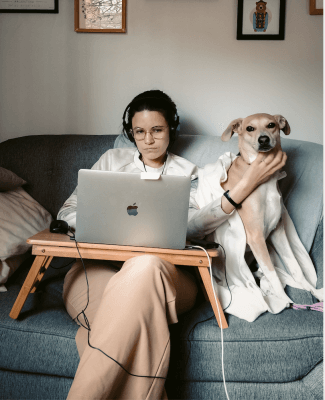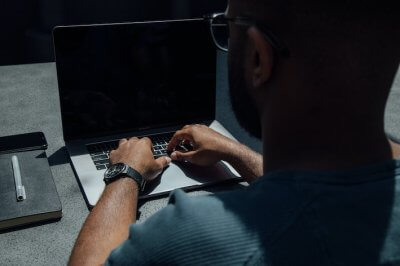Digital Fatigue – Is Your Screen Time Killing Your Wellbeing?

photo by Cristian Tarzi
By Claudia Cole
Does the familiar blue glow of a device make your eyes sore after a day of being behind a screen? But also perhaps give you a feeling of being worn out and depleted, or even a bit low? It’s likely you’re feeling the brunt of digital fatigue.
What is digital fatigue?
The term is used to describe a state of mental exhaustion brought on by the excessive use of digital devices.
Also referred to as ‘screen burnout’, it’s not a new discovery. But it’s been bought to the forefront since the Covid-19 pandemic, From working from home, to staying entertained and connected with others, digital technology has never been so popular (‘Zoom fatigue’, anyone?).
According to a 2020 report by Ofcom, UK adults are now spending more than a quarter of each day online, a record high.
Common symptoms
Considering digital fatigue is another form of mental exhaustion, the symptoms are generally similar.
Signs include the following:
- low energy levels
- lack of motivation
- difficulty concentrating
- feeling anxious or overwhelmed
- low mood
- sore, watery, or irritated eyes
- headaches or migraines
- difficulty falling asleep
- sensitivity to light
- pain and discomfort in neck, shoulders and back.
Why does digital fatigue happen?
 So then why are we all so numb and tired after a day of working from home?
So then why are we all so numb and tired after a day of working from home?
1. Poor lighting.
The false light of our computers, the infamous ‘blue light’, is a contributing factor. It affects our sleep cycles.
Harvard Health explains that blue wavelengths boost attention. Useful in the day, but contributing to poor sleep if we are exposing ourselves at night.
And poor sleep is directly connected to low moods. Research estimates that about three quarters of those who are depressed also suffer insomnia.
2. Elevated work-based pressures.
Endless Zoom meetings are exhausting. They lack the social connection and body language cues of in-person gatherings. They can also feel more stressful when others have a close up of your face, and can see your subtle reactions more than if, say, they were across a table.
3. Needing to be more focussed.
Digital tools like Zoom also generally require more attention and focus than face-face interactions. This is because we are forced to consciously monitor non-verbal cues and make direct eye-contact when speaking. No wonder it’s exhausting and we are left with digital fatigue.
4. Going into FOMO.
An interesting study published in the Journal of World Social Psychiatry looked at how our excessive technology use during Covid-19 affected stress. What it found was that working from home, without the monitoring and rules of working in an office, meant most of us had social media and news constantly going in the background.
And this ‘background listening’, where we constantly receive bits of information, leads to a sort of fear of missing out (FOMO). Meaning we feel obliged to be constantly available to all this incoming info. Which led to feelings of stress.
5. There are no stopping cues.
According to a Ted talk by psychologist Adam Alter, the reason why our digital usage has increased is because there’s no stopping cues. These are signals that give the gentle nudge to move on to something different.
For example, with books, when you reach the end of a chapter, it prompts you to consider whether you want to continue reading. These cues allow us some breathing space, preventing us from exhausting ourselves.
On the other hand, digital tools are a bottomless pit, making us want to keep on consuming and working for hours at a time. As a result, the balance between online and offline usage becomes blurred.
What can be done about digital fatigue?
 While digital devices are here to stay, we can still use them in a way that’s manageable. It all stems down to balance, allowing you to adjust your lifestyle in a way that suits you best.
While digital devices are here to stay, we can still use them in a way that’s manageable. It all stems down to balance, allowing you to adjust your lifestyle in a way that suits you best.
1. Take regular breaks to stop digital fatigue.
Although most digital tools lack stopping cues, incorporating a gentle reminder to take regular breaks is a great way to make up for it. This could look like setting an alarm, or sticking to a regular schedule of breaks.
You might want to incorporate some stretching, or a mini mindfulness break, which helps lower stress.
1. Be mindful.
Speaking of mindfulness. Sometimes, we use our devices out of habit, or as a way of distracting ourselves. Being mindful helps you identify these triggers and then question what other alternatives might be healthier.
Of course, it takes time to cultivate a mindful awareness. On the other hand, a daily mindfulness practise of even only ten minutes has been found to lower anxiety and improve concentration.
3. Dedicate time for offline activities.
Before you tuck into a new Netflix series after a long day working behind a screen, it’s worth considering another way to unwind that is easy on the eye and doesn’t simply add to digital fatigue. And ideally something that leads to better mobility, like exercising, to improve posture and alleviate the stiffness, aches and pains a life in front of a screen brings.
If you have kids, consider spending time together with all of you off screen. You set the example when it comes to kids and technology.
5. Set boundaries.
Just because digital technology is a part of our everyday lives, doesn’t mean our usage is non-negotiable.
Setting boundaries is vital when it comes to balancing your work with the rest of you life. It enables you to prioritise what you value most, easing the stress of decision making.
Is the truth that it’s not just your screen but your job that has you depressed? We connect you with highly regarded London therapists who can help you stop feeling stuck. Or use our therapy booking platform to find your perfect UK-wide therapist or online counsellor now.
 Claudia Cole is a London-based writer and journalist. An enthusiast for books and all things screen related, she is also passionate about sustainable living, mental health, and wellbeing.
Claudia Cole is a London-based writer and journalist. An enthusiast for books and all things screen related, she is also passionate about sustainable living, mental health, and wellbeing.





